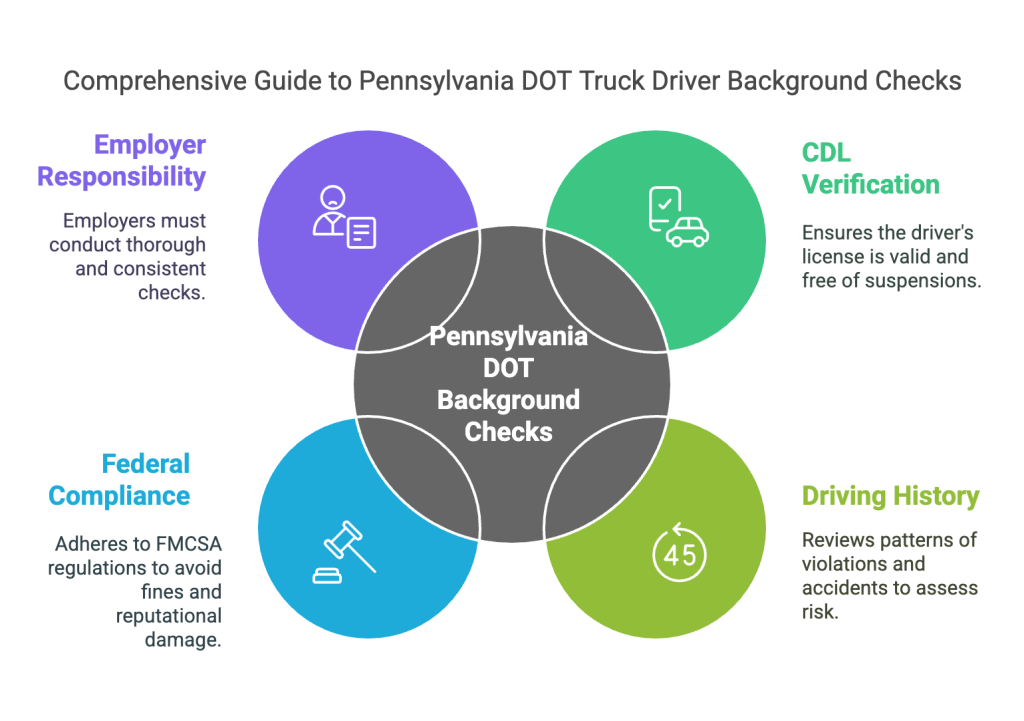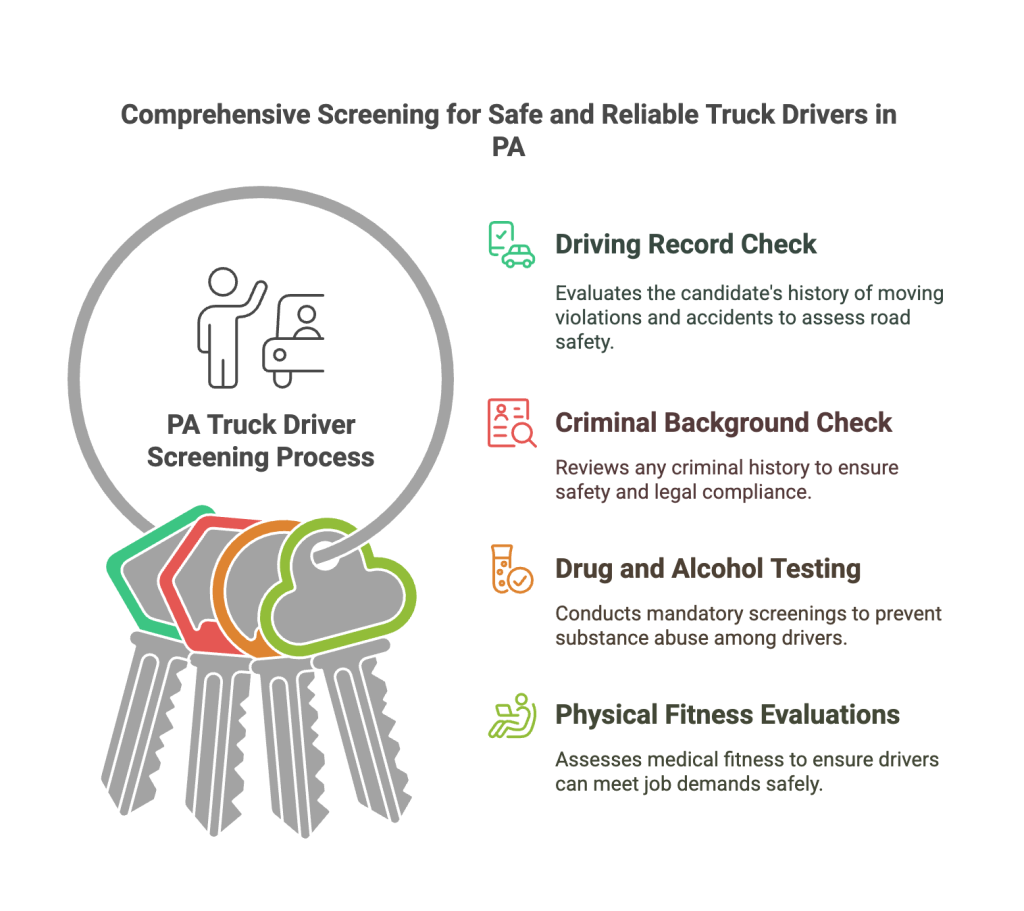Navigating the complexities of background checks within the trucking industry can be daunting, especially when ensuring compliance with the Department of Transportation (DOT) requirements. In Pennsylvania, these checks are essential for maintaining safety and adherence to state and federal regulations. This comprehensive guide will walk you through everything you need to know about Pennsylvania DOT background checks, from understanding the requirements to ensuring your business stays compliant.
Key Takeaways
- Pennsylvania DOT background checks ensure that commercial drivers are qualified and reliable, which is crucial for maintaining safety in the trucking industry.
- They involve verifying a driverâs CDL status, driving history, criminal record, and fitness to minimize potential risks on the road.
- Compliance with FMCSA regulations is essential, failure of which can result in significant fines, higher insurance costs, or suspension from operations.
- CDL disqualifications can arise from DUI convictions, felonies, or repeated traffic violations, with varying reinstatement procedures based on the offense.
- Implementing a comprehensive and technology-supported screening process can help your company stay compliant and maintain a safe driving workforce.
Introduction
Whether you're a trucking company looking to hire new drivers or a driver yourself aiming to clear the hiring process, understanding the intricacies of Pennsylvania DOT background checks is crucial. These checks are more than just formalitiesâthey are essential for ensuring that drivers on the road are both qualified and trustworthy. In Pennsylvania, the focus on DOT compliance is critical to maintain safety and reliability in the trucking industry. By understanding these background checks, you can navigate the hiring landscape with confidence. This guide aims to equip you with detailed information on Pennsylvania truck driver screening, FMCSA compliance, and CDL disqualifications, ensuring that you stay on the right path in maintaining compliance.
Understanding Pennsylvania DOT Background Checks
Background checks in the trucking industry aren't just about sifting through a candidate's history. These checks ensure that commercial drivers are safety-compliant and professionally reliable. In Pennsylvania, DOT background checks play a crucial part in the hiring process for truck drivers and involve several key components that trucking companies must consider.

Pennsylvania DOT background checks are thorough. They verify a driverâs qualifications, experience, and overall track record. This process often starts with checking a candidate's Commercial Driver's License (CDL) status, ensuring it's valid and free of any suspensions or revocations. Employers must look beyond the CDL, examining driving histories for patterns of violations or repeated accidents. This due diligence helps filter out risky drivers and minimizes potential liabilities.
Federal guidelines, primarily set by the Federal Motor Carrier Safety Administration (FMCSA), heavily influence these checks. The FMCSA mandates specific requirements for commercial drivers that align with safety and operational standards. Employers must understand these regulations to avoid non-compliance. Missing a step, like failing to conduct a thorough background screening, can lead to hefty fines and weigh heavily on a companyâs reputation.
Responsibility for conducting these checks falls squarely on the employer. They need to establish clear procedures for their hiring processes, ensuring each check is consistent and comprehensive. Background screenings might involve multiple layers, from looking at criminal records to past employment verifications. Employers should gather this data while respecting privacy laws and securing sensitive information appropriately.
Navigating these regulations can seem overwhelming. However, consider asking yourself: Are your background check processes as thorough as they could be? Are you compliant with both state and federal regulations? Through consistent practice and vigilance, these checks not only protect your company but also contribute to safer highways.
Key Components of PA Truck Driver Screening
Background checks in the trucking industry aren't just paperwork. They're vital safeguards for both companies and the public. In Pennsylvania, the process begins with several key components, each critical to the hiring process.

First, the driving record check. You want to know your potential hire's history on the road. This involves reviewing any moving violations or accidents. A poor driving record often signals recklessness or lack of discipline. For example, multiple speeding tickets or at-fault accidents within a short period could indicate a pattern you can't ignore.
Then there's the criminal background check. Safety and legal compliance hinge on this. Any criminal history, particularly related to violence or drug offenses, is a red flag. Why? Truck drivers handle expensive shipments and operate large vehicles that can pose serious risks. While a minor, non-violent offense from years ago might not be disqualifying, a recent conviction for theft could definitely be.
Drug and alcohol testing is next. The DOT mandates these to curb substance abuse. Drivers must be screened before employment and on a random basis afterward. Catching substance abuse early can prevent accidents, saving lives and cutting down on liability risks for your company.
Physical fitness evaluations round out the screening process. The DOT requires drivers to pass medical examinations. These check for vision, hearing, and physical mobility. Can your potential hire handle the demands of a commercial vehicle? A clean bill of health doesn't just tick a regulatory box; it ensures the driver can perform safely day in and day out.
These components form the backbone of a thorough background check, each with its part in minimizing risk and promoting safety. What does your screening process look like? Are you applying these checks systematically? Remember, every hire not only represents your company but also impacts public safety on the roads.
FMCSA Compliance in Pennsylvania
The Federal Motor Carrier Safety Administration (FMCSA) sets the standards for commercial driver's license (CDL) holders across the United States. For Pennsylvania drivers and companies, understanding these regulations is crucial. The FMCSA rules are in place to ensure road safety and minimize risks associated with commercial vehicle operations.
To start, familiarize yourself with key FMCSA regulations such as the Hours of Service rules, which limit the number of hours a driver can be on duty to reduce fatigue-related accidents. The Compliance, Safety, Accountability (CSA) program is another essential component. It scores carriers based on safety data, allowing regulators to identify those in need of intervention.
Staying compliant requires regular policy updates. Businesses should have a system for documenting driver qualifications, training, and incident records. Investing in software tools that track and manage this data can be beneficial, ensuring nothing slips through the cracks.
If you fail to comply with FMCSA standards, the repercussions can be severe. Non-compliance can result in steep fines, increased insurance premiums, and suspensions from operating. For example, repeated safety violations might lead to a company being placed out of service, halting operations until compliance is restored.
Regular training for staff and drivers is a proactive approach. It keeps everyone informed about regulatory changes and reinforces the importance of safety protocols. Encourage open communication about compliance issues to catch potential problems early.
Maintaining FMCSA compliance may seem challenging, but with the right practices, it's manageable. Adopting a structured approach with consistent reviews and updates to your policies will keep your operations in line and your drivers on the road. Are your current practices robust enough to meet these standards?
CDL Disqualifications in Pennsylvania
CDL disqualifications in Pennsylvania can stem from various infractions, both at the state and federal levels. The most common reasons include driving under the influence, committing a felony with a vehicle, and accumulating excessive traffic violations. A DUI conviction, for example, results in an automatic one-year disqualification for first-time offenders. Repeated offenses, or using a commercial vehicle in a felony, can lead to a lifetime ban.
To navigate these pitfalls, being vigilant about your driving record is crucial. Always keep an eye on any points or violations, and address them promptly. For instance, a speeding ticket might seem minor, but accumulating violations can lead to disqualification faster than you might think.
Reinstatement involves a combination of serving the disqualification period, completing any required courses (like DUI education), and paying necessary fees. After fulfilling these, you can apply for reinstatement. It's also wise to stay informed about regulation changes, as these can affect the reinstatement conditions.
Maintaining a clean record and understanding these disqualification factors can save a lot of hassle. Have you reviewed your driving history lately? Sometimes a proactive approach can save your livelihood on the road.
How Employers Can Implement Effective Screening
Creating an effective screening process is essential for maintaining compliance and ensuring safety in your trucking operations. Here are some practical steps you can take.
Developing a Screening Policy: Start by crafting a clear and concise background check policy outlining what will be checked and the standards drivers must meet. Consult legal counsel to ensure your policy complies with both state and federal laws. Make sure your policy addresses compliance with FMCSA guidelines and includes checks like motor vehicle records, criminal history, and drug testing.
Utilizing Technology: Technology can simplify the process. There are many services available that can automate background checks, ensuring they are thorough and consistent. Consider using software that integrates with your current systems and offers real-time updates. This can help manage documentation, track compliance, and speed up the hiring process.
Training and Compliance: Training your staff is crucial to ensure that your policies are applied consistently and correctly. Regularly conduct training sessions to keep your team informed about changes in laws and regulations. Emphasize the significance of accuracy and fairness in conducting background checks. Consistent training helps prevent mistakes and avoids potential legal issues.
Implementing these measures not only helps maintain compliance with DOT standards but also boosts confidence in your hiring process. Make sure that each step in your screening process is documented and regularly reviewed to adapt to any regulatory changes. How have you integrated these practices into your hiring processes?
Legal Considerations and Best Practices
Every employment background check must align with federal regulations. The Equal Employment Opportunity Commission (EEOC) provides guidance to ensure your practices are non-discriminatory. You should familiarize yourself with this information to avoid potential legal pitfalls. The goal is to make hiring decisions based on impartial, relevant criteria.
Handling sensitive information necessitates a focus on privacy and confidentiality. Only access essential data and store it securely. Limiting exposure ensures respect for individuals' privacy and protects your company from data breaches. State and federal laws typically dictate the specifics, so ensure your protocols are compliant.
Applicants have the right to contest background check findings. Providing a clear path for appeals is not just about fairness; itâs a legal necessity. When you receive a challenge, take it seriously. Review the data for inaccuracies or context that may change the interpretation of the information. Not only does this practice safeguard the rights of applicants, but it also reinforces your companyâs reputation as a fair and responsible employer.
Conclusion
Effective background checks in the Pennsylvania trucking industry serve as a crucial component in ensuring regulatory compliance and road safety. Youâve seen how robust screening processes help mitigate risks and enhance your business operations. Conducting these checks thoroughly not only aligns with DOT and FMCSA standards but also underscores your commitment to safety.
Approach background checks with diligence and regularity. Staying informed on evolving regulations will put you in a strong position to adapt without compromising on safety. Each update and policy adjustment can be a meaningful step towards safer roads and a more reliable workforce.
Keep your screening policies up-to-date and make use of available technology to streamline your processes. This will aid in maintaining efficiency and accuracy in hiring practices. Consider the legal and ethical aspects, such as respecting applicant privacy and offering fair appeal processes.
Ultimately, comprehensive background checks are more than a regulatory requirement. They represent a proactive measure to safeguard your business and those who share the road. Engage with the ongoing dialogue around compliance and safety, and commit to regular reviews of your practices to foster a culture of responsibility and vigilance in your operations.
Frequently Asked Questions (FAQs)
What disqualifies you from a CDL in Pennsylvania?
Criminal convictions, DUIs, leaving the scene of an accident, using a vehicle to commit a felony, and serious traffic violations can lead to disqualification. Other offenses include driving with a suspended license or causing a fatal accident due to negligent driving.
How far back do PA trucking background checks go?
Background checks can typically go back seven to ten years, though employers may use their discretion for longer periods, especially for serious offenses.
Can a DUI prevent CDL employment in PA?
Yes, a DUI can prevent you from obtaining or keeping a CDL. Employers also have policies on hiring drivers with DUIs, and having one may limit job opportunities.
Does Pennsylvania require hair follicle drug tests?
Pennsylvania does not mandate hair follicle drug tests for CDL holders, but employers may choose to use them as part of their testing policies.
How to check a driverâs PSP report in PA?
You can request your PSP (Pre-Employment Screening Program) report through the Federal Motor Carrier Safety Administration website. This report shows crash and inspection history.
Are PA CDL holders subject to random drug tests?
Yes, CDL holders in Pennsylvania are subject to random drug tests, as required by federal regulations to ensure road safety.
Can out-of-state violations affect PA CDL jobs?
Yes, violations committed in other states can affect your CDL status in Pennsylvania. These violations are reported to your licensing state and can lead to penalties or disqualification.
How to appeal a CDL disqualification in PA?
You can appeal by requesting an administrative hearing with the Pennsylvania Department of Transportation (PennDOT). It's crucial to present strong evidence or arguments supporting your appeal.
Do PA delivery drivers need DOT checks?
If they operate vehicles over a certain weight or transport hazardous materials, they will need DOT physical exams and background checks.
Whatâs the cost of DOT background checks in PA?
The cost varies depending on the service provider, but typically ranges between $10 to $30. Some comprehensive checks may cost more.
What types of drug tests are commonly used for CDL holders in PA?
Urine tests are the most common, but some employers may also use saliva or blood tests depending on their policy.
How often must CDL holders undergo medical examinations in PA?
CDL holders must undergo a DOT medical examination every two years to ensure they meet health and safety requirements.
Can Pennsylvania suspend your CDL for unpaid traffic tickets?
Yes, unpaid traffic tickets can result in a suspension of your CDL until resolved.
Are there specific age requirements for obtaining a CDL in PA?
Yes, you must be at least 18 years old for intrastate (within Pennsylvania) CDL driving and at least 21 for interstate (across state lines) driving.
What endorsements are available for a CDL in Pennsylvania?
Endorsements include Hazmat, Passenger, School Bus, Doubles/Triples, and Tank vehicles. Each requires additional tests and fees.
Definitions
Background Check
A background check is a process employers use to verify a candidateâs qualifications, driving history, criminal record, and other relevant details before hire. In trucking, this includes reviewing a driverâs Commercial Driverâs License (CDL) status, accident history, and safety record. It helps companies assess if a candidate meets safety and compliance requirements.
Drug and Alcohol Testing
Drug and alcohol testing ensures drivers are free from substances that could impair their performance. Required by the Department of Transportation (DOT), it involves pre-employment screening, random tests during employment, and follow-ups after any violations. Regular testing can prevent accidents and reduce liability.
FMCSA Compliance
FMCSA compliance means meeting rules set by the Federal Motor Carrier Safety Administration. This includes policies on driver qualifications, hours of service, and safety reporting. Staying compliant reduces the risk of penalties, helps avoid suspensions, and builds a stronger safety record.
CDL Disqualification
A CDL disqualification temporarily or permanently removes a commercial driverâs license due to serious traffic violations, DUIs, or criminal offenses. First offenses may result in a one-year ban; repeated or severe infractions can lead to lifetime disqualification. Regular monitoring of driver behavior helps prevent disqualifications.
Screening Policy
A screening policy outlines the procedures a company follows when checking new hires. It defines what will be reviewed, like driving records, criminal history, and medical certifications. A clear policy ensures consistency, improves hiring decisions, and helps meet legal and safety standards.
Reference

GCheck Editorial Team
Meet the GCheck Editorial Team, your trusted source for insightful and up-to-date information in the world of employment background checks. Committed to delivering the latest trends, best practices, and industry insights, our team is dedicated to keeping you informed.
With a passion for ensuring accuracy, compliance, and efficiency in background screening, we are your go-to experts in the field. Stay tuned for our comprehensive articles, guides, and analysis, designed to empower businesses and individuals with the knowledge they need to make informed decisions.
At GCheck, we're here to guide you through the complexities of background checks, every step of the way.





